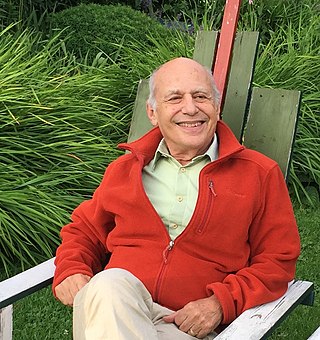Related Research Articles

Adolescence is a transitional stage of physical and psychological development that generally occurs during the period from puberty to adulthood. Adolescence is usually associated with the teenage years, but its physical, psychological or cultural expressions may begin earlier or end later. Puberty typically begins during preadolescence, particularly in females. Physical growth and cognitive development can extend past the teens. Age provides only a rough marker of adolescence, and scholars have not agreed upon a precise definition. Some definitions start as early as 10 and end as late 30. The World Health Organization definition officially designates an adolescent as someone between the ages of 10 and 19.

Positive youth development (PYD) programs are designed to optimize youth developmental progress. This is sought through a positivistic approach that emphasizes the inherent potential, strengths, and capabilities youth hold. PYD differs from other approaches within youth development work in that it rejects an emphasis on trying to correct what is considered wrong with children's behavior or development, renouncing a problem-oriented lens. Instead, it seeks to cultivate various personal assets and external contexts known to be important to human development.
Gender dysphoria in children (GD), also known as gender incongruence of childhood, is a formal diagnosis for children who experience significant discontent due to a mismatch between their assigned sex and gender identity. The diagnostic label gender identity disorder in children (GIDC) was used by the Diagnostic and Statistical Manual of Mental Disorders (DSM) until it was renamed gender dysphoria in children in 2013 with the release of the DSM-5. The diagnosis was renamed to remove the stigma associated with the term disorder.
Paul B. Baltes was a German psychologist whose broad scientific agenda was devoted to establishing and promoting the life-span orientation of human development. He was also a theorist in the field of the psychology of aging. He has been described by American Psychologist as one of the most influential developmental psychologists.
Spermarche, also known as semenarche, is the time at which a male experiences his first ejaculation. It is considered to be the counterpart of menarche in girls. Depending on upbringing, cultural differences, and prior sexual knowledge, males may have different reactions to spermarche, ranging from fear to excitement. Spermarche is one of the first events in the life of a male leading to sexual maturity. It occurs at the time when the secondary sex characteristics are just beginning to develop. Researchers have had difficulty determining the onset of spermarche because it is reliant on self-reporting. Other methods to determine it have included the examination of urine samples to determine the presence of spermatozoa. The presence of sperm in urine is referred to as spermaturia.

Mark Stemmler was born on August 7, 1960, in Norwood, Massachusetts, United States. He was Professor of Psychological Methodology and Quality Assurance at the Faculty of Psychology and Sports Science, Bielefeld University from 2007 to 2011. He was also a member of the Center for Statistics at Bielefeld University. Currently he is Professor of Psychological Assessment at the Department of Psychology and Sports Science at the University of Erlangen-Nuremberg. Since 2010 he is also Adjunct Professor at the College of Health and Human Development at the Pennsylvania State University.

Frank Folke Furstenberg Jr. is the Zellerbach Family Professor of Sociology, Emeritus, at the University of Pennsylvania. His research focuses on the family in the context of disadvantaged urban neighborhoods and adolescent sexual behavior. Furstenberg has written extensively on social change, transition to adulthood, divorce, remarriage and intergenerational relations. Furstenberg is an elected member of the National Academy of Medicine, American Academy of Arts and Sciences, and American Academy of Political and Social Science.

Laurence Steinberg is an American university professor of psychology, specializing in adolescent psychological development.
Jeanne Brooks-Gunn is an American developmental psychologist and professor. She is currently the Virginia and Leonard Marx Professor of Child Development at Teachers College, Columbia University.
Velma McBride Murry is an American psychologist and sociologist, currently the Lois Autrey Betts Chair in Education and Human Development and Joe B. Wyatt Distinguished University Professor at Vanderbilt University. Her research has largely focused on resilience and protective factors for African-American families, and she has several publications in this area. In addition to her empirical research, she has contributed to several published books and used her experience to create two family-based preventative intervention programs.
Jelena Obradovic is a developmental psychologist who currently works as associate professor at the Stanford Graduate School of Education, where she is a member of the Steering Committee of the Center for Education Policy Analysis (CEPA). She also directs the Stanford Project on Adaptation and Resilience in Kids (SPARK).
Nancy E. Hill is an American developmental psychologist. She is the Charles Bigelow Professor of Education at the Harvard Graduate School of Education. Hill is an expert on the impact of parental involvement in adolescent development, cultural influences on minority youth development, and academic discourse socialization, defined as parents' academic beliefs, expectations, and behaviors that foster their children's academic and career goals.
Stephen Thomas Russell is an American sociologist. He is the Priscilla Pond Flawn Regents Professor in Child Development at University of Texas at Austin. Russell was a distinguished professor and Fitch Nesbitt Endowed Chair in Family and Consumer Sciences at University of Arizona from 2007 to 2015. He researches adolescent development, sexuality, LGBT youth, and parent-adolescent relationships.
Adriana Galván is an American psychologist and expert on adolescent brain development. She is a professor of psychology at the University of California, Los Angeles (UCLA) where she directs the Developmental Neuroscience laboratory. She was appointed the Jeffrey Wenzel Term Chair in Behavioral Neuroscience and the Dean of Undergraduate Education at UCLA.
Adolescent sleep is typically poor in duration and quality. Sleep duration and quality reduce to suboptimal levels, and sleep duration variability and latency increases during adolescence. Sleep recommendations suggest that adolescents should obtain 8–10 hours of sleep per night. Additionally, there is a shift in the body's circadian rhythm such that sleep and wake timings become later during adolescence. Technology, social factors, and physical development are thought to contribute to poor sleep during this time. Poor sleep duration and quality in adolescents has been linked with altered brain functioning and development, poor mental and physical health, as well as higher rates of disease and mortality. The concerns surrounding poor sleep during adolescence has garnered significant public attention, especially concerning policies related to school start times. Many evidences suggest that sleep contributes positively to attention, behavior, and academic achievement for adolescents.

Della Marie Hann is an American psychologist and research administrator serving as the associate director for extramural research at the Eunice Kennedy Shriver National Institute of Child Health and Human Development.

BJ Casey is an American cognitive neuroscientist and expert on adolescent brain development and self control. She is the Christina L. Williams Professor of Neuroscience at Barnard College of Columbia University where she directs the Fundamentals of the Adolescent Brain (FAB) Lab and is an Affiliated Professor of the Justice Collaboratory at Yale Law School, Yale University.
Jennifer Woolard is a developmental psychologist known for work within the juvenile justice system. Woolard is professor of psychology and adjunct professor of law at Georgetown University. She is involved in the Youth In Custody Practice Model Initiative at the Center for Juvenile Justice Reform at Georgetown University's McCourt School of Public Policy, which seeks to adopt evidence-based developmentally-appropriate practices within juvenile correctional institutions.
Carola Suárez-Orozco is a cultural developmental psychologist, academic, and author. She is a Professor in Residence at the Harvard Graduate School of Education, and the Director of the Immigration Initiative at Harvard. She is also the co-founder of Re-Imagining Migration, a nonprofit organization.
Corinna Jenkins Tucker is an American Human Development and Family Studies researcher most known for her research on sibling conflict, aggression, and abuse. She is the Director of the Sibling Aggression and Abuse Research Advocacy Initiative (SAARA), for the Crimes Against Children Research Center at the University of New Hampshire.
References
- 1 2 3 4 5 "Anne C Petersen" (PDF). Archived (PDF) from the original on October 26, 2020.
- ↑ "Women Leaders: Anne C. Petersen, PhD". Home Monitor on Psychology. 38 (37): 72. July–August 2007. Archived from the original on October 26, 2020.
- ↑ "Anne C Petersen". World Cat Identities. Archived from the original on November 19, 2020.
- ↑ "Rhonda Pauline Studley". Morrison County Record. August 26, 2015. Retrieved November 28, 2020.
- ↑ "Commencement Program 1937" (PDF). University of Minnesota Digital Conservancy. Retrieved July 20, 2022.
- ↑ Petersen, Anne C.; Tobin-Richards, Maryse; Boxer, Andrew (1983). "Puberty: Its measurement and its meaning". The Journal of Early Adolescence. 3 (1–2): 47–62. doi:10.1177/027243168331005. ISSN 0272-4316. S2CID 144676059.
- ↑ Petersen, Anne C.; Crockett, Lisa; Richards, Maryse; Boxer, Andrew (April 1, 1988). "A self-report measure of pubertal status: Reliability, validity, and initial norms". Journal of Youth and Adolescence. 17 (2): 117–133. doi:10.1007/BF01537962. ISSN 1573-6601. PMID 24277579. S2CID 19254396.
- ↑ Koopman-Verhoeff, Maria Elisabeth; Gredvig-Ardito, Caroline; Barker, David H.; Saletin, Jared M.; Carskadon, Mary A. (2020-05-01). "Classifying Pubertal Development Using Child and Parent Report: Comparing the Pubertal Development Scales to Tanner Staging". Journal of Adolescent Health. 66 (5): 597–602. doi:10.1016/j.jadohealth.2019.11.308. ISSN 1054-139X. PMID 31974011. S2CID 210882185.
- ↑ "History of the College of Health and Human Development". Penn State College of Health and Human Development. Retrieved November 28, 2020.
- 1 2 "Anne C. Petersen". Research Gate. Archived from the original on October 9, 2015.
- ↑ Press Releases, 1991, University of Minnesota News Service, 1991, hdl:11299/52028
- ↑ Update, 1992, University Relations, 1992, hdl:11299/148666
- ↑ "Board and Staff – GPA" . Retrieved November 28, 2020.
- ↑ "Kellogg V.P. of Programming to Start Own Nonprofit".
- 1 2 "Anne C. Petersen". YouthActionNet. June 24, 2014. Retrieved November 28, 2020.
- ↑ Petersen, Anne C.; Joseph, Joshua; Feit, Monica; Policy Committee on Child Maltreatment Research; Youth Board on Children; Committee on Law and Justice; Institute of Medicine; National Research Council (March 25, 2014). Biosketches of Committee Members. National Academies Press.
- ↑ "Anne C. Petersen". University of Michigan LSA International Institute. Retrieved November 28, 2020.
- ↑ "Faculty Affiliates". Science, Technology, and Public Policy Program at Ford School of Public Policy. University of Michigan.
- 1 2 3 "Anne C. Petersen". CRDF Global. Retrieved 2020-11-28.
- 1 2 3 "Anne C Petersen, Ph.D." www.templetonworldcharity.org. Retrieved November 28, 2020.